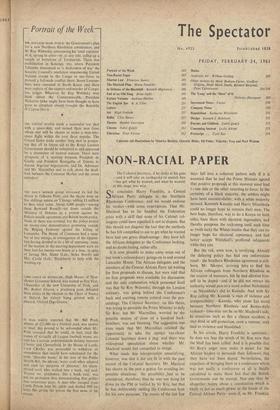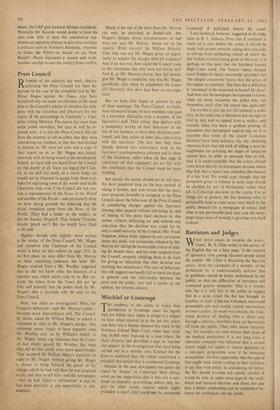NON-RACIAL PAPER
The Colonial Secretary, if he sticks to his guns —and it will take an earthquake to unstick him —has got what he wanted; and what he wanted, at this stage, was wise.
CO concludes Harry Franklin, a Central African Party delegate to the Northern Rhodesian Conference; and we would endorse his verdict—with some reservations. That Mr. Macleod has so far handled the Federation crisis with a skill that none of his Cabinet col- leagues could have equalled is not in dispute. But this should not disguise the fact that the methods he has felt compelled to use to get what he wanted have had one grave disadvantage : they have left the African delegates to the Conference looking, and no doubt feeling, rather silly.
It is now pbssible to make some sense out of last week's extraordinary goings-on in and around Lancaster House. The African delegates and the members of the Central African Party sat waiting for firm proposals to discuss, but were told that no firm proposals were available for discussion; and the only explanation which presented itself was that Sir Roy Welensky, through his London emissary, was going behind the Conference's back and exerting remote control over the pro- ceedings. The Colonial Secretary, on this thesis, was trying to persuade the Prime Minister to defy Sir Roy; but Mr. Macmillan, worried by the possible mutiny of close on a hundred back- benchers, was not listening. The suggestion was even made that Mr. Macmillan relished the opportunity to take the upstart too-clever Colonial Secretary down a peg: and there was widespread speculation about whether Mr. Macleod would feel compelled to resign.
What made this interpretation unsatisfying, however, was that it did not fit in with the past record of the Colonial Secretary. Mr. Macleod has shown in the past a genius for avoiding im- possible situations : the possibility ,had to be considered, therefore, that he was not being let down by the PM or bullied by Sir Roy, but that he was deliberately stalling the Conference here for his own purposes. The events of the last few
days fall into a coherent pattern only if it is assumed that he and the Prime Minister agreed that positive proposals at this moment must lead to one side or the other resorting to force. In the certainty of a black majority, the settlers might have been uncontrollable; with a white majority secured, Kenneth Kaunda and Harry Nkumbula could no longer hope to restrain their men. The best hope, therefore, was to do a Kenya on both sides, haze them with electoral ingenuities. and thereby postpone the reckoning until such time as (with luck) the Whites realise that they can no longer hope for electoral .supremacy, and had better accept Whitehall's proffered safeguards while they can.
But the risk, even now, is terrifying. Already the delaying policy has had one unfortunate result : the Southern Rhodesian agreement is still- born. Mr. Nkomo, arriving here to find his African colleagues from Northern Rhodesia in the sourest of humours, felt he had allowed him- self to be duped—and if he did not retract his authority would pass to a more ardent Nationalist —as Nkumbula's did to Kaunda. And with Sir Roy calling Mr. Kaunda `a man of violence and irresponsibility'—Kaunda, who alone has stood between Northern Rhodesia and Kenya-style violence—time may not be on Mr. Macleod's side. In situations such as this a chance accident, a shot fired in self-protection, even a rumour. may lead to violence and bloodshed.
In his article, Harry Franklin is optimistic: he does not fear the wrath of Sir Roy now that the bluff has been called. And it is possible that Sir Roy's anger may make it easier for the African leaders to persuade their followers that they have not been duped. Nevertheless, the expedient of bringing them to a conference which was not really a conference at all is hardly calculated to make them feel that the British Government can be trusted. Nor can they be altogether, happy about a constitution which is likely to put' so much power in the hands of the Central African Party—even if, as Mr. Franklin insists, the CAP puts forward African candidates. Naturally Mr. Kaunda would prefer to have his own men. Still, at least this constitution rep- resents an ingenious attempt to give non-racialism a political start in Northern Rhodesia; whatever its faults, the White—or should we say Non- Racial?—Paper represents a sincere and work- manlike attempt to save the country from conflict.







































 Previous page
Previous page